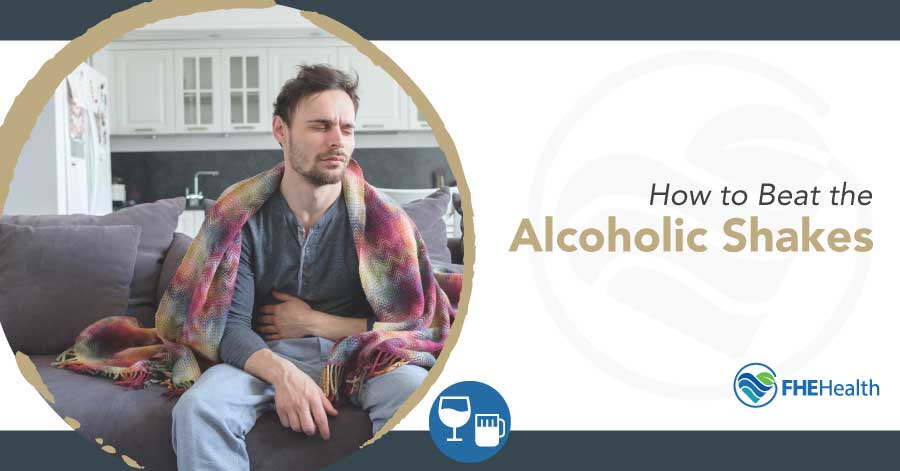
The term alcoholic shakes is used to describe a common symptom of alcohol withdrawal in which the person experiences tremors or shakes. These are especially common in the arms and hands. While it’s true that many people who have been addicted to alcohol for years may experience tremors or shakes related to their alcohol use, it’s also possible for someone to experience alcohol shakes at any time. You don’t have to have struggled with alcohol for years or be dealing with a severe addiction to suffer the shakes. To better understand how to get rid of alcohol shakes, we first have to take an in-depth look at why they occur and what’s happening in the body when someone experiences these shakes or tremors.
What Causes Alcoholic Shakes?
To understand what causes alcoholic shakes, you first have to understand what happens in the body when you drink alcohol. Alcohol is classified as a nervous system suppressant, which means it slows down your nervous system. Your heart rate drops, your blood pressure lowers, your breathing rate decreases and your brain has less activity. As the alcohol wears off, your nervous system starts to fire up again. However, if you’ve been drinking alcohol for a long time, your body may have become accustomed to operating at that suppressed level, so when the nervous system starts back up, your brain reads it as too much activity. As it tries to cope with the influx of messages from the nervous system, your brain sends out signals that create the shakes or tremors you’re experiencing.
In the case of long-term alcoholics, though, shakes can be a sign of delirium tremens, which is a very serious condition. While shakes are common with delirium tremens, it can also bring on seizures, which result in convulsions that may resemble shaking. Dealing with delirium tremens can be extremely painful and difficult, and it’s something that indicates your body isn’t able to handle the current situation well and needs help, most likely in the form of medical attention. Left untreated, delirium tremens can be fatal.
If friends, family and other loved ones have commented on your shakes or tremors, or expressed concern about your use of alcohol, it may be time to consider getting help. Those on the outside are often able to see things that the addict cannot when they are in full-blown addiction, and while seeking help can seem scary, it’s better than continuing to deal with an out-of-control addiction that’s harming your body, relationships and quality of life.
How Do You Stop Alcoholic Shakes?
How you stop alcoholic shakes is going to depend heavily on why the shakes are happening. It’s not unusual for someone to experience shakes in the morning after a night of heavy drinking, but if that drinking is happening on an occasional basis, this may not mean that the person is actually an alcoholic.
As we talked about above, consuming too much alcohol has a very dehydrating effect on your body, and your nervous system tries to start recovering balance as the alcohol wears off. Shakes in this situation may just be a sign of a bad hangover and can be remedied with rest, hydration, light exercise and not drinking more. However, it is important to note that shaking after drinking does indicate that you’re drinking too much.
If this is something you’re experiencing, it may be helpful to have an honest conversation with yourself — and even possibly enlist some trusted advisors such as family, friends or a therapist — about whether you’re drinking in excess as a negative coping behavior. The earlier you can recognize drinking as a problematic behavior, the better the chances are of stopping an addiction before it starts or getting the help you need to move toward sobriety.
However, if you’re experiencing alcoholic shakes related to delirium tremens, it’s important to seek medical help immediately. In cases of long-term alcohol use, withdrawal can be very dangerous and cause serious issues, including high blood pressure, a dangerously high heart rate, seizures and hallucinations. While the best thing you can do is go through a medical detox program to safely end your body’s physical dependence on alcohol, you may need further medical treatment to help you address any issues that have been caused by the drinking.
Seeking Treatment for Alcoholic Shakes
While alcoholic shakes may be a common condition for those struggling with alcohol addiction or long-term alcohol use, they’re not something to be taken lightly. We’ve already covered the seriousness of delirium tremens, but even if the shakes haven’t progressed to that level, they’re still a clear indication that alcohol use is affecting your body negatively.
Once you’ve made the decision to get sober, it’s very important to have the right support system around you. Trying to detox from alcohol on your own, or trying to quit “cold turkey,” can be very dangerous. Alcohol withdrawal syndrome can be life-threatening if your blood pressure and heart rate are not managed during the detox process.
It’s important to seek help from an alcohol treatment program, like the one we offer at FHE Health, to ensure your detox is managed safely and you have the support you need to address the underlying issues behind your addiction. Our staff is prepared to help you focus on your physical health, so the detox process is as comfortable as possible. Once you’re through the withdrawal period, our ongoing support services can help you deal with the behavioral, emotional and mental components that drove your addiction, so you can work toward achieving long-term sobriety.
For more information about the alcohol treatment programs we offer and how we can help you end your battle with alcohol and get back to a healthy life, contact FHE Health today.






